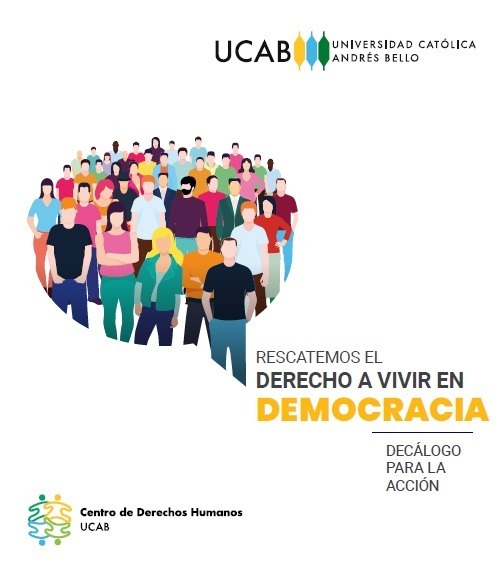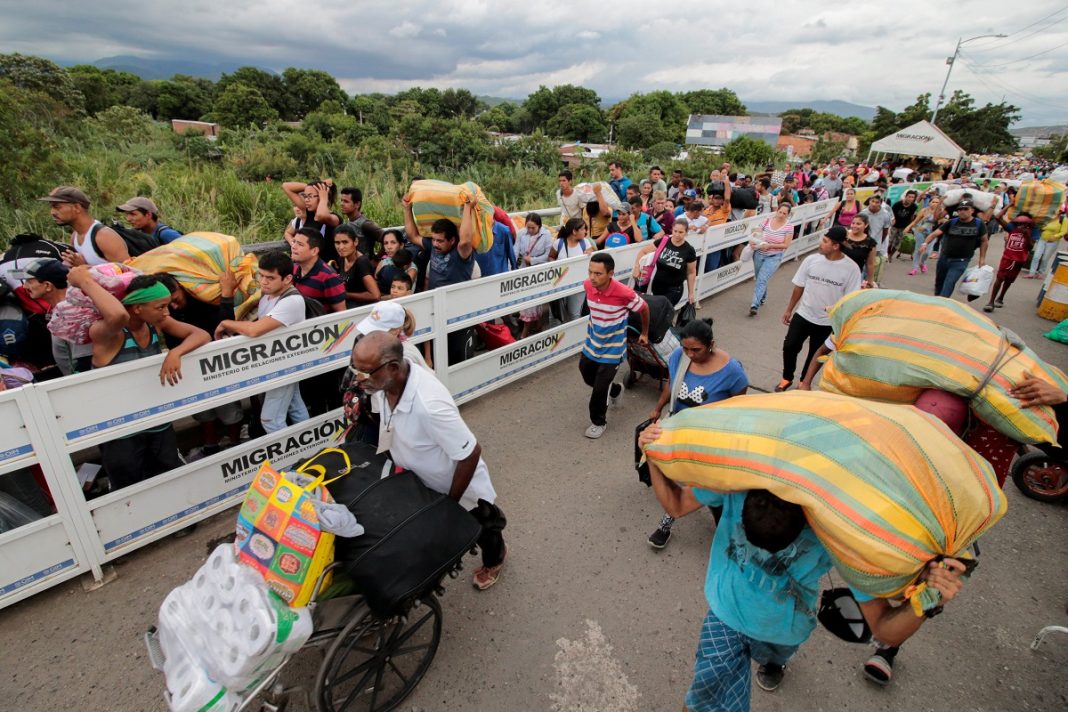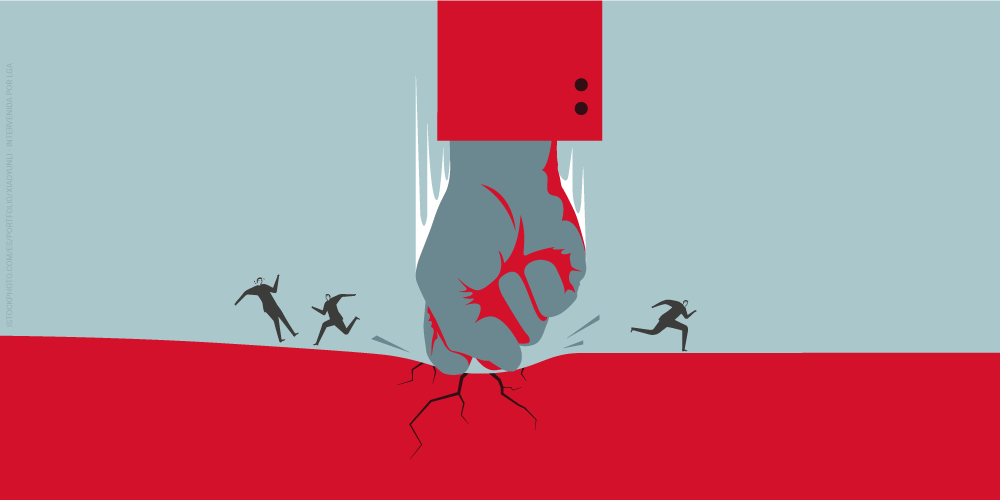The Public Ministry (PM) has not been shy about making a 180-degree turn in high-profile cases of human rights violations, in what appears to be a maneuver to show that the alleged perpetrators of these violations are being prosecuted and prevent the Prosecutor’s Office of the International Criminal Court (ICC) from opening a formal investigation for crimes against humanity against senior Venezuelan officials.
This is not an isolated event but part of a strategy of the ruling party for presenting an image of collaboration with the ICC. Some the elements that support this affirmation are the appointment of Gladys Gutiérrez as the new ambassador before the Court; the release of a decree for the restructuring of the Bolivarian National Police (PNB), a security organ that comprises the Special Action Forces (FAES), harshly questioned by several international human rights bodies; and the May 1 statement by Attorney General Tarek William Saab in which he indicated having sent a third set of documentation to the ICC Prosecutor’s Office informing it of the status of the cases on which it formulated some requirements.
The prosecutor referred to the case of councilor Fernando Albán, which had previously been described as suicide while in custody; Now, he clarified that Albán was the subject of wrongful death by his custodians on October 5, 2018.
This should not be surprising since it is part of a mechanism to show that human rights violations in Venezuela are punished and that the Venezuelan State collaborates with the ICC Prosecutor’s Office, which is its obligation under the Rome Statute.
Regarding Albán’s case, the official said that “at the time (the Public Ministry) charged the officials involved in this unfortunate event with the crime of breaking custody rules.” However, it later decided to rectify and “requested the annulment for having found violations of fundamental guarantees”, as well as an “arrest warrant against the two guards for the charges of manslaughter, violation of custody rules, conspiracy, and favoring the escape of a detainee”.
This statement is diametrically opposed to what the prosecutor had said five days after the death of Albán, during a press conference in which he described as “staging” and “half-truths” the recounts of those who argued that the death of the opposition politician had been caused by his captors:
“During lunchtime, Albán abruptly got up from the table saying that he wanted to go to the bathroom. He took advantage of that circumstance and ran to a window in the hallway of the 10th floor of the Bolivarian National Intelligence Service (SEBIN) headquarters in Plaza Venezuela and jumped into the void.”
Changing versions
There was also a change in the case of university student Juan Pablo Pernalete. “This young man died after being hit in the chest with a tear gas canister. The public ministry achieved the indictment of twelve officers [of the National Guard] for the crime of pre-intentional homicide in a degree of correspective complicity” said Saab, ignoring that this had already been demonstrated by the MP during the administration of Luisa Ortega Díaz.
“He was hit by an object like this. A tear gas canister hit him”, said Ortega, now attorney general in exile, less than a month after the young man’s death.
However, Saab did not validate that thesis, according to his own words in September 2017. The reason? He considered it dubious. “We discovered that the criminal laboratory of the Prosecutor’s Office was used to alter evidence, and that is serious; we are in the investigation stage, but that is extremely serious,” he told EFE during an interview. Almost four years later, he seems to admit that his predecessor was right.
Even so, the change of charges is not enough to affirm that justice is being served in Venezuela; furthermore, in none of these cases are senior managers held accountable for the crimes, as required by the Rome Statute.
Why now?
As we indicated, the announcements from the Public Ministry are not for free. In this regard, Ortega Díaz stated that:
“Recognizing the commission of human rights violations in the murders of Pernalete, Albán, and Acosta Arévalo does not seek to do justice but rather to exempt the high-ranking individuals identified in the preliminary examination before the ICC. This is a show of fear because they know they will be judged.
This version was corroborated by Saab himself, who on May 1 stated that:
“It must be remembered that the ICC has a complementary character to the national criminal jurisdictions of the countries that are party to the Rome Statute. In other words, this instance intervenes when the possible cases that may be within its competence have not been investigated by the justice system of a State party”.
According to the prosecutor, the single fact of investigating a case would prevent the action of the ICC, but this is not the case since Article 17.2 of the Rome Statute determines that the court must open an investigation if the domestic proceedings sought to shield the person concerned from criminal responsibility; the national investigation suffers an unjustified delay, or it has not been conducted in an independent and impartial manner.
It is evident that all the assumptions described above apply to the Venezuelan case, where neither the highest-ranking officials nor the chain of command is investigated, delays are the norm, and crimes are incorrectly classified to favor the perpetrators.
Hence, the prosecutor affirmed that “our commitment to investigate” the human rights violations committed in the country has become clear, suggesting that the Hague court does not have to interfere. And as proof of that commitment, he assured that 1,064 officers and 136 civilians have been charged for violating human rights, 540 officers and 30 individuals have been detained and 133 convictions have been achieved in the three years and eight months of his term in office. Compare these figures with the cases of human rights violations that occur every day in the country. As an example, Provea denounced that only in 2020 there were 2,853 extrajudicial killings in the country. Is there impunity or not?
The origin of the changes in the aforementioned cases seems to be that the ICC Prosecutor’s Office is about to announce whether the alleged crimes against humanity committed in the country since 2014 that was denounced by several non-governmental organizations and the UN Human Rights Council International Fact-Finding Mission on Venezuela, among others, will be brought before the Court. In fact, last November, the office of Ghanaian lawyer Fatou Bensouda said it had “reasonable grounds” to believe that crimes against humanity had been committed in the country.
Saab’s maneuvers should not affect the international court’s decision. The reason? The actions of the PM have been confined to low-ranking officials, despite the Mission finding that some of these practices could not be committed without the knowledge and consent of senior officials.
The report, published in September 2020, noted the following:
“The mission has reasonable grounds to believe that the President; the Minister of Interior, Justice and Peace; and the Minister for Defence ordered or contributed to the commission of the crimes documented in the report, and having the effective ability to take preventive and repressive measures, failed to do so”.
In this sense, Article 28 of the Rome Statute states:
“In addition to other grounds of criminal responsibility under this Statute for crimes within the jurisdiction of the Court: A military commander or person effectively acting as a military commander shall be criminally responsible for crimes within the jurisdiction of the Court committed by forces under his or her effective command and control, or effective authority and control as the case may be, as a result of his or her failure to exercise control properly over such forces”
Relatives speak out
Saab’s turn was not well received by the relatives of Albán, Pernalete, or Captain Rafael Acosta Arévalo, another of the cases in which the authorities backed down from their original position to admit that he was a victim of human rights violations.
In a statement, the relatives of councilor Albán expressed the following:
«This May 1, 2021, Saab, an accomplice and cover-up for the crimes of arbitrary detention, enforced disappearance, torture, and extrajudicial killing of councilor Fernando Albán, presented new information on the case at a press conference, with the sole intention of confusing public opinion and pretending to deceive the International Criminal Court, making believe that he is investigating and prosecuting the crimes committed against Fernando Albán and other victims of the dictatorship.
They also accused the Public Ministry of staging “a media show.”
In similar terms, Juan Pablo Pernalete’s parents spoke up, lashing out at the crimes charged against the military officers who participated in the death of his son. Elvira de Pernalete, the student’s mother, added:
“They speak of complicity as if our son had been killed by a mob in an isolated event when the truth is that he was the victim of the systematic action of the regime to attack the civilian population within the context of the criminalization of protests ».
For its part, the Alliance of Relatives and Victims of the Anti-Government Protests of 2017 (Alfavic) demanded from the authorities a serious and transparent investigation of the more than 100 deaths registered during the wave of demonstrations that occurred in the country after rulings 155 and 156 of the Constitutional Chamber of the Supreme Tribunal of Justice that annulled the National Assembly controlled by the opposition.
And how does it affect Venezuelans?
Saab’s turn seems to be another demonstration of how Venezuelan justice is not independent and, instead of protecting citizens and repairing the damages committed by the State -especially atrocity crimes-, acts to protect the rulers. It seems that it only seeks to prevent national officials from becoming the first Latin Americans to be held accountable before the ICC, a body created to punish serious human rights violations such as genocide, torture, arbitrary detentions, enforced disappearances, and persecution.
The admission that Albán and Pernalete died as a result of the illegal actions of officials and that the alleged perpetrators will be punished – although this has not happened yet since there has not been a conviction- is an important but insufficient gesture because they are not isolated events.
For years, the Venezuelan State has pursued a policy of systematic attack against the population, especially those that oppose the Government, as has been denounced by national and international organizations. This situation makes it clear that there are others responsible for these crimes who must also be brought before justice.
Translated by José Rafael Medina




